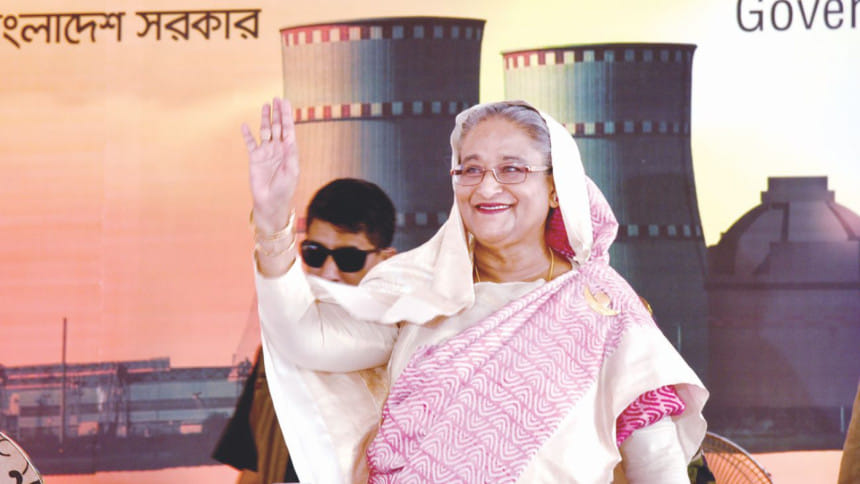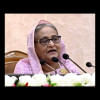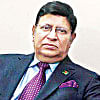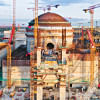It's a pride for the nation

Bangladesh yesterday stepped into the “world of nuclear energy” as Prime Minister Sheikh Hasina inaugurated the main construction work of the Rooppur Nuclear Power Plant, the first such plant in the country.
She formally launched the construction work by pouring concrete into the plant site in Iswardi's Rooppur in the morning.
Speaking on the occasion, she said, “This is a joyful day for us. Bangladesh enters the world of nuclear energy with the beginning of the construction work of the main structure. It's a pride and joy for us as a nation.”
Taking a swipe at the critics of the nuclear power plant project, she said those who raised questions “lacked self-confidence”.
“There's a quarter that raises questions in TV channels about various issues as some 23 satellite TV stations are in operation out of 44. They shouldn't have thought that we are less patriotic than them.”
Hasina said her government has put utmost importance on ensuring overall nuclear security during the construction of the plant.
The then Awami League government in 2009 had taken initiatives to meet the high demand for electricity, she said. “We drew up short, mid and long-term plans to meet the demand. The total electricity production capacity has now risen to nearly 16,000 megawatt. About 83 percent people have come under electricity coverage.
“We'll get 1,200 megawatt electricity from the Rooppur power plant by 2023 and another 1,200 megawatt by the following year. Nearly 10 percent of the total produced electricity will come from the nuclear energy source by that time.”
Hasina said her government gave top priority to nuclear safety and radiological protections in implementing the power plant project. “We're strictly following International Atomic Energy Association safety standards and other relevant guidelines as well as the international good practices.
“We've promulgated Bangladesh Atomic Energy Regulatory Act, 2012 to strengthen national nuclear regulatory infrastructure to ensure safe and secured applications to nuclear techniques and building the country's first nuclear power plant.”
The PM said Bangladesh's nuclear energy programme was very transparent. The country signed all the major international treaties, agreements and protocols related to nuclear non-proliferation, she added.
Hasina said the design of the Rooppur power plant was developed in such a way that it would not lead to any accident, be it caused by nature or human beings.
“We've also taken proper initiatives for training of manpower for safe operation of the plant. Measures have also been taken so that it does not cause any harm to human beings and environment.”
She said one of the main concerns of any nuclear power plant is its waste management. Under a deal signed with Russia in this regard, the country would take the waste, the PM told the programme.
Science and Technology Minister Yafesh Osman, PM's Economic Affairs Adviser Moshiur Rahman, Energy Adviser Tawfiq-e-Elahi Chowdhury, Security Adviser Major General (retd) Tariq Ahmed Siddiqui, Army Chief General Abu Belal Muhammad Shafiul Huq, Russian Ambassador to Bangladesh Alexander Ignatov, Russian state-run atomic energy body Rosatom Director General Alexey Likhachev and Chief Engineer of Bangladesh Atomic Energy Commission (BAEC) Md Abdur Razzak were present, among others.
ROSATOM DG MEETS PM
Earlier in the day, Rosatom DG Likhachev met the prime minister at its Rooppur office.
Likhachev congratulated Hasina for taking initiatives to build the nuclear power plant, PM's Press Secretary Ihsanul Karim told reporters after the meeting.
The Rosatom official said India might join the power plant project.
Hasina thanked Russian President Vladimir Putin for providing assistance to the construction of the power plant.
Mentioning that Bangladesh has special relations with Russia, the PM recalled Moscow's contributions to the Liberation War in 1971.
The Rooppur plant is expected to supply 2,400 MW electricity to the national grid by 2024, helping the country meet its growing demand for electricity.
The mega project is being implemented by state-run BAEC under the science and technology ministry, with technical and technological support from Rosatom.
The BAEC and Russian firm JSC Atomstroyexport had inked a contract for the construction of the power plant on December 25, 2015.
Atomstroyexport, the contractor appointed by Rosatom, will build the power plant at a cost of $12.65 billion.
The Bangladesh government on November 2, 2011, signed a deal with Rosatom to construct the nuclear plant on 262 acres of land.
Russia will provide all assistance under the agreement for setting up the plant, including providing the fuel and taking back the used fuel.
Hasina had laid the foundation stone of the power plant on October 2, 2013.0
The government on December 15, 2015 had finalised the amount for the biggest-ever investment project in the country's history by striking an initial agreement with Russia.

 For all latest news, follow The Daily Star's Google News channel.
For all latest news, follow The Daily Star's Google News channel. 








Comments